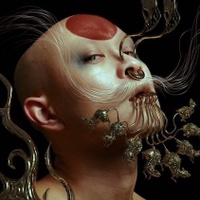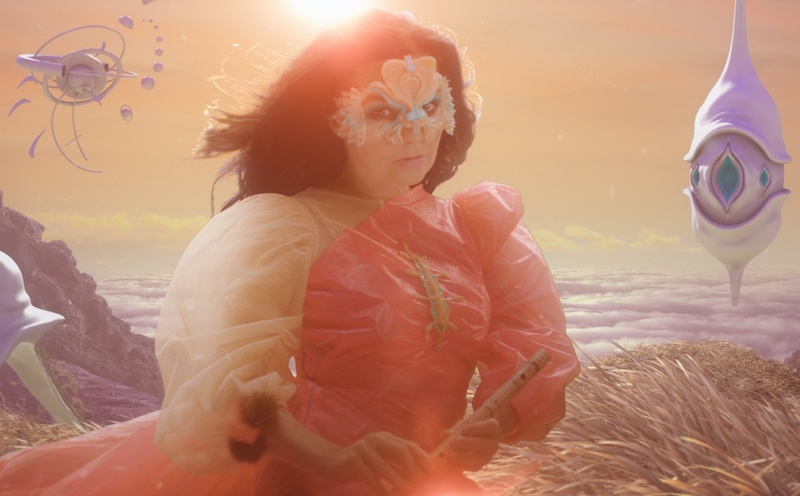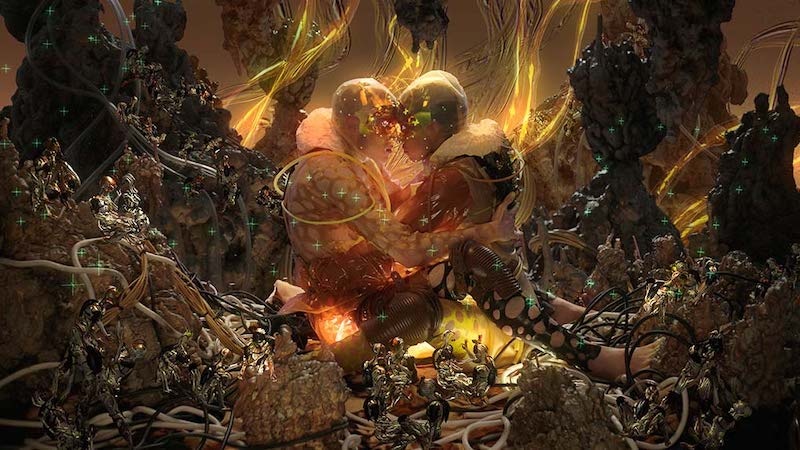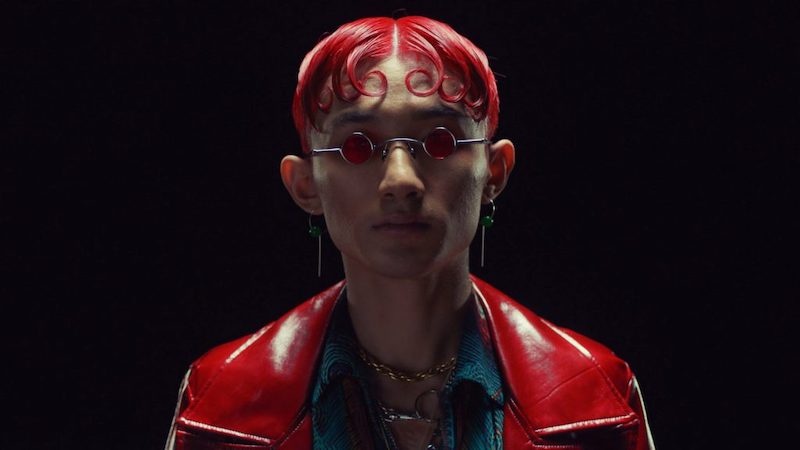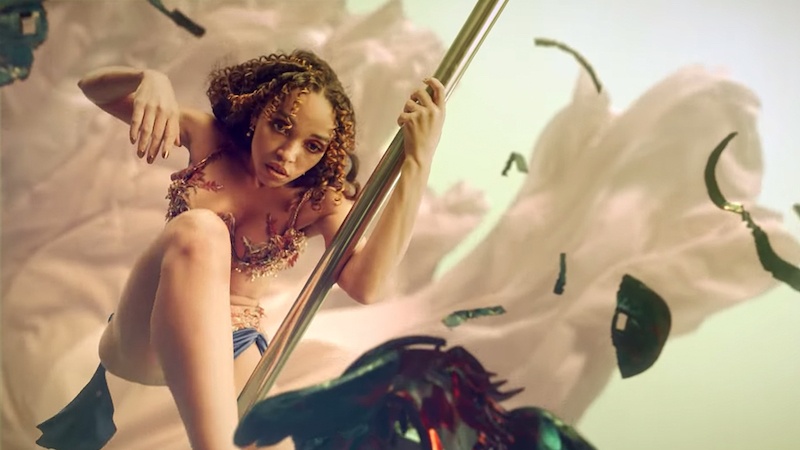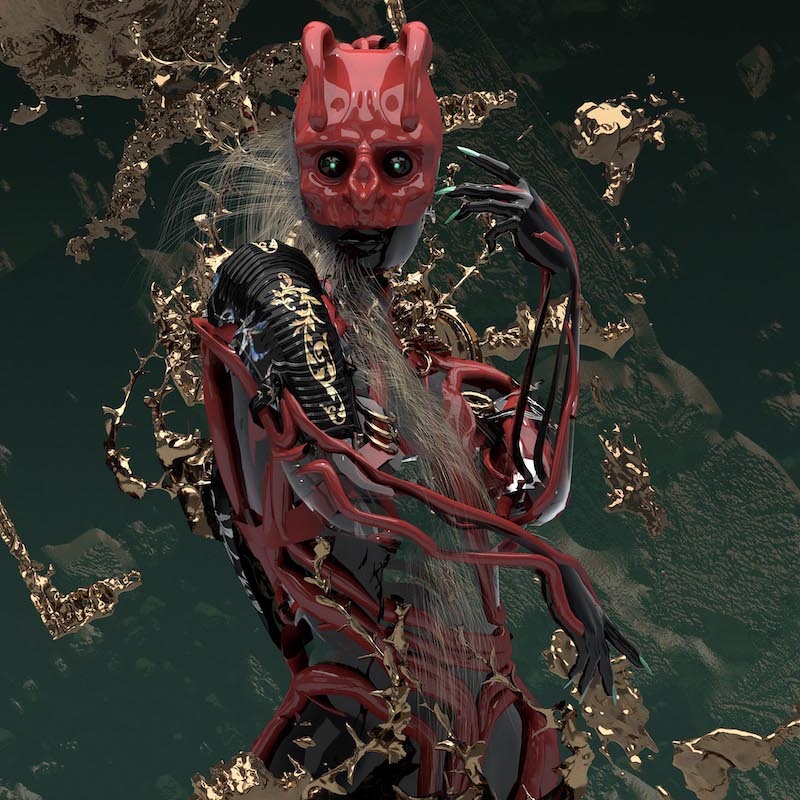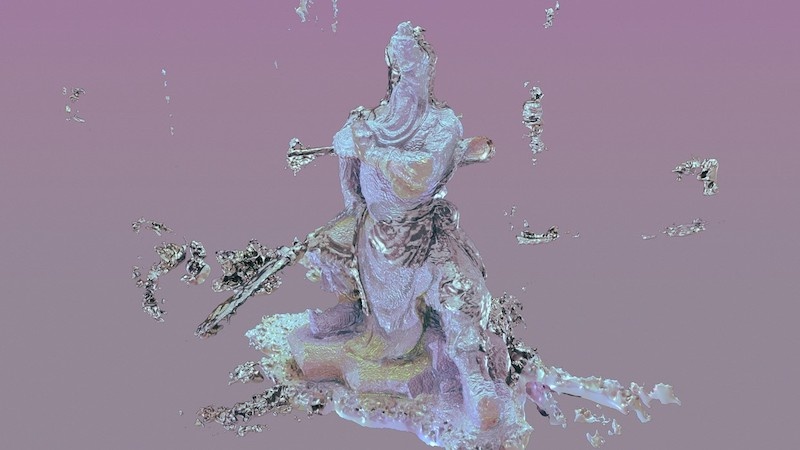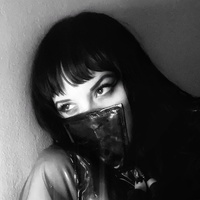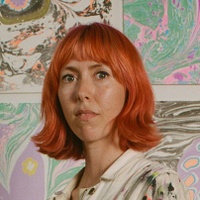As told to Samantha Ayson, 1366 words.
Tags: Film, Art, Music, Identity, Collaboration, Process, Inspiration.
On being versatile
Visual artist and filmmaker Andrew Thomas Huang discusses his interest in masks, the collective potential of anti-authorship, and the creative thrill in tinkering with new technologies.You once tweeted, “Being mysterious is so much work.” I think about that a lot. Can we unpack it?
It is! Self-curation is such a chore. These days our online activity is all about being perceived and it’s exhausting. Like I wish I could be shadowy and mysterious and all that but I don’t really think I have the restraint to hide my true form as a basic clown.
Still from ‘The Gate,’ Björk and Andrew Thomas Huang
Clowns, masks, obstructing the face, etc. are common threads in many of your works. Where does this creative impulse come from?
I’m not sure exactly, but I got into puppetry as a kid and I think I gravitated towards the idea of performing a character by proxy, of inhabiting a stage and telling a story while still being hidden. I like the immediate psychological layers a mask brings, and the uncanny feeling you get when the mask peels off and you reveal what’s beneath. Masks are a quick cheat to create mystery and I love that they’re talismanic, cross-cultural and go back thousands of years.
Still from Flesh Nest, Andrew Thomas Huang
In your previous interviews, you speak a lot about how it took you some time to embrace weaving your own identity into your work. How do you feel about that now?
Looking back in my 20s, I remember I used to feel physically ill when confronted about my identity, when asked to speak about it or weave it into my work. I think over time it’s become an imperative to address it, maybe because hiding became boring and insufferable but also making “formalist” work felt too safe and privileged in the cultural political landscape we’re in. Making exciting work has always required me to lean into things that make me uncomfortable, and now that I’ve dipped my toe deeper and deeper into unpacking my identity, I can’t really go back. The personal excavation continues, I guess.
Still from Kiss of the Rabbit God, Andrew Thomas Huang
To date, identity within internet culture has leaned so far into presenting the most “authentic” version of yourself. Do you think this influence manifests in your own work at all?
Ah, I can’t help but bump on the word “authentic.” I’m not sure what that even means —I’d be lying if I said I knew how to even locate that. I think that as artists, we are all protean, we’re changing constantly and our interests evolve and shift. Nothing about ourselves is fixed, so claiming an authentic version of myself is hard to grasp. I hope that whatever I’m outputting is less about claiming an identity but rather sharing what I’m honestly passionate about and nerding out on, in as real time as possible.
Still from ‘Cellophane,’ FKA Twigs and Andrew Thomas Huang
I mostly ask about “authenticity” because I’m going to take a turn, but what do you think about the metaverse?
It’s hard to think about the metaverse when the real world is burning. It’s also just a branding term coined by Facebook. There are already infinite metaverses that we’ve been inhabiting since the dawn of the Internet.
Hyperskins, Andrew Thomas Huang
One ideal of the metaverse is that you can embody many identities or you can be anonymous. I feel like we’re moving towards a culture that will become more about embracing anti-identity. What do you think about that?
I do think that the concept of anti-identity can be liberating. It feels more like Web 1.0 when we were all just anonymous digital spelunkers wandering the virtual maze of the web and being an Internet user had nothing to do about being seen or perceived. The de-emphasis on identity might make us all more active participants in reclaiming a sense of agency and building a world we really want to live in. It also makes me think about the younger generation of artists I’ve met who are much more aggressively collaborative and embracing anti-authorship in their work. That kind of generous spirit feels galvanizing at this time when we are desperately in need of collective organizing. So, I’m all for it.
Fire Cock, Andrew Thomas Huang
You work across so many mediums. What’s your process like when you come across any new technology?
Sometimes I see new tech that makes it easier to use something that can be really laborious. And my first reaction is, “Oh god, all the hours I wasted trying to achieve X, it’s so easy now and I’ll never get that time back.” So sometimes it’s dread, or regret.
Sometimes I see something and it’s really scary because it seems to make a previously valuable process obsolete. You might say that about Midjourney AI. It’s so easy to make any conceivable image now. And now people are AI-generating 3D volumes and shapes. What’s the value of sculpting anything by hand when you can create any imagined 3D shape by typing it into a text box? Of course painters must’ve felt this way when photography arrived. But I also get excited, too. Like when I see how film production is embracing XR volume LED stages. You can really put people in any game-engine environment and it looks seamless.
When I was 14 years old, I discovered how to key out a blue screen with my home video equipment, and that night I was so feverish with excitement I couldn’t sleep. The possibilities were endless. So, sometimes new tech arrives and it’s like my brain is on fire with everything I could do with it and I literally make myself ill getting addicted to tinkering, staying up all night throwing myself deep into it.
Andrew Thomas Huang Recommends:
Books:
Gods of Want by K-Ming Chang
Freshwater by Akwaeke Emezi
Joan by Katherine J. Chen
Home Remedies by Xuan Juliana Wang
Stories of the Sahara by Sanmao, translated by Mike Fu
Digital Spirits in Religion & Media by Alvin Eng Hui Lim
Cosmicomics by Italo Calvino
Bestiary by K-Ming Chang
Of Water and the Spirit by Malidoma Patrice Some
Songlines by Bruce Chatwin
Autobiography of Red by Anne Carson
The Death of Vivek Oji by Akwaeke Emezi
The Buried Giant by Kazuo Ishiguro
Geontologies by Elizabeth Povinelli
AI 2041: Ten Visions for Our Future by Chen Qiufan
Albums:
Caterina Barbieri - Spirit Exit
Sasami - Squeeze
Raja Kirik - Rampokan
DAEMON - AEOS
Gabber Modus Operandi - PUXXXIMAXXX
Klein - Lifetime
Laraaji - Flow Goes the Universe
Tinashe - 333
Hyph11e - Aperture
Fatima Al Qadiri - Medieval Femme/i>
Prison Religion - Hard Industrial Bop/i>
Crystallmess - Mere Noises/i>
Kara-Lis Coverdale - Grafts/i>
Iceboy Violet - The Vanity Project
Tzusing - Next Life/i>
Films:
This Is Not A Burial, It’s A Resurrection directed by Lemohang Jeremiah Mosese
Neptune Frost directed by Saul Williams & Anisia Uzeyman
Cemetery of Splendour directed by Apichatpong Weerasethaku
Kaili Blues directed by Bi Gan
The Skin I Live In directed by Pedro Almodovar
Follow That Bird directed by Ken Kwapis
Babe: Pig in the City directed by George Miller
Orlando directed by Sally Potter
Casanova directed by Federico Fellini
Belly directed by Hype Williams
The Devils by Ken Russell
Shadows of Forgotten Ancestors directed by Sergei Parajanov
Artists:
WangShui
Angela Dimayuga
Marguerite Humeau
Guadalupe Maravilla
Auriea Harvey
Donna Huanca
Rafa Esparza
Nadhir Nor
Phasmahammer
Lucy McRae
Gabriela Ruiz
Jenkin van Zyl
Otobong Nkanga
Inka Essenhigh
011668
Ian Cheng
Rashaad Newsome
Jacolby Satterwhite
Tea Strazicic
Tianzhuo Chen
Vince McKelvie
Nate Boyce
Chino Amobi

